|

Noble Scholar
Dr. Ananda Coomaraswamy :
~(Great Minds)~
He was praised for his “brilliant insight” by the American
Mythologist and writer, Joseph Campbell. Heinrich Zimmer, the German
academic and historian of South Asian Art,described him as that “noble
scholar upon whose shoulders we are still standing.”
Dr. Ananda Kentish Coomaraswamy was one of the great art historians
of the twentieth century who wrote about visual art, aesthetics,
literature , language, folklore, mythology, religion, and metaphysics.
He was a pioneering scholar in the fields of Sri Lankan and Indian art
and culture, as well as an expert on the study of world religions.
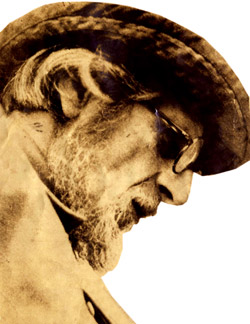 Born in Colombo, on August 22, 1877, at the age of two, he lost his
father, the Tamil legislator and philosopher, who was the first Asian
and Sri Lankan to be knighted, Sir Muthu Coomaraswamy. After his
father’s death he traveled to England with his English mother, Elizabeth
Beeby and spent much of his childhood abroad. Born in Colombo, on August 22, 1877, at the age of two, he lost his
father, the Tamil legislator and philosopher, who was the first Asian
and Sri Lankan to be knighted, Sir Muthu Coomaraswamy. After his
father’s death he traveled to England with his English mother, Elizabeth
Beeby and spent much of his childhood abroad.
Educated at Wycliffe College and at London University, in 1900, he
graduated with a degree in geology and botany. In 1902, he returned to
Sri Lanka and his field work earned him a doctor of science for his
study of Ceylonese mineralogy. He also established the Geological Survey
of Ceylon.
But the path he would travel for the rest of his life lay elsewhere.
While in Ceylon, he became absorbed in a study of the traditional arts
and crafts of Ceylon and of the social conditions under which they had
been produced. He and his photographer wife started to study Mediaeval
Sinhalese Art and to record their findings. Dr. Coomaraswamy wrote the
text and his English wife, Ethel provided the photographs. It was at
this time that he also began to notice how the presence of the British
in Ceylon was affecting the culture and society of the country.
In 1906 Dr. Coomaraswamy founded the Ceylon Social Reform Society of
which he was the inaugural President and moving force. The Society
addressed itself to the preservation and revival not only of traditional
arts and crafts but also of the social values and customs which had
helped to shape them. The Society also dedicated itself, to discouraging
“the thoughtless imitation of unsuitable European habits and custom.”
Dr. Coomaraswamy called for a re-awakened pride in Ceylon’s past and in
her cultural heritage. The fact that he was half-English in no way
affected his wish to oppose the changes brought about by British rule in
Ceylon.
By 1906, Dr. Coomaraswamy had made it his mission to educate the West
about Ceylon and Indian art, and was back in London with a large
collection of photographs. In 1908 he wrote “The main difficulty so far
seems to have been that Indian art has been studied so far only by
archaeologists. It is not archaeologists, but artists … who are the best
qualified to judge of the significance of works of art considered as
art.” In England he found his own social ideas in the work of William
Blake, John Ruskin, and William Morris who like him spoke against the
industrial revolution.
In 1917 he went to the USA where he became Keeper of Indian and
Islamic Art at the Boston Museum of Fine Arts, establishing a large
collection of Oriental artifacts. In 1933 Dr. Coomaraswamy’s title at
the Museum of Fine Arts changed from curator to Fellow for Research in
Indian, Persian, and Mohammedan Art.
Through 1932, from his home in Boston, he produced two kinds of
publications: brilliant works about preserving art, as well as
beautifully written introductions to Indian and Asian art and culture,
such as the book titled “The Dance of Shiva,” a collection of essays
that have lost none of their attractiveness and remain in print to this
day.
In 1947 Dr. Coomaraswamy intended to retire from his position as
Curator at the Boston Museum of Fine Arts in order to return to India,
where he planned to complete a new translation of the Upanishads and
live the life of a hermit. These plans, however, were cut short by his
sudden and untimely death on September 9, 1947 at the age of seventy.
Dr. Coomaraswamy believed the world is one home to all mankind and
said, “I actually think in both Eastern and Christian terms—Greek,
Latin, Sanskrit, Pali, and to some extent Persian and Chinese.” He will
always be remembered as the scholar who built a bridge between the East
and the West.
Aditha ([email protected])
Do your work yourself !
Dear children,
All of us are busy with some kind of work through out our lives. You,
children have to go to school and study, your parents have to go to
office or sometimes your mother may not be employed. But that does not
mean that she has no work. How many chores does she have to attend to
during one day! Cooking, cleaning the household, washing clothes,
looking after you if you fall sick, arranging the home garden etc. With
or without the help of a domestic aide your mother does all this work
with no complaints. Your father too works hard; he has to go to office
as well as buy necessary goods and help mother with some of her chores.
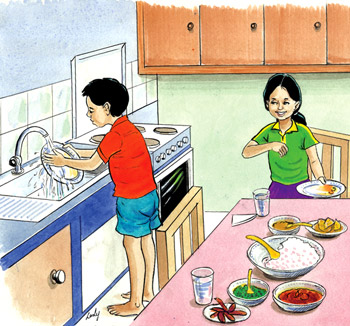 What about you? You have to study hard and achieve your educational
goals. That should be your priority. However from your small days you
should get used to doing your work by yourself. Some of you may not
bother to wash your plate after meals. It is not proper to leave your
plate on the table with the leftover food and make somebody else clean
it. Once you are finished with your meals it is better to take it to the
sink and clean it. Not only your one, you can also help your parents by
washing their plates too. It will be a relief for them. What about you? You have to study hard and achieve your educational
goals. That should be your priority. However from your small days you
should get used to doing your work by yourself. Some of you may not
bother to wash your plate after meals. It is not proper to leave your
plate on the table with the leftover food and make somebody else clean
it. Once you are finished with your meals it is better to take it to the
sink and clean it. Not only your one, you can also help your parents by
washing their plates too. It will be a relief for them.
Most of you must have washing machines at home. But some of you may
still be washing clothes without the help of a machine. Whatever method
is used, it is better if you can do the task yourself during the
weekends. You can help your parents by washing their clothes as well.
When you are free you can help your mother with the kitchen chores.
My dear boys, you should know that cooking and other house work are not
labeled as ‘girls’ work.’ You also can help your mother by scraping
coconuts or by cutting vegetables when you are free. Household work
should not be handled entirely by women.
Both girls and boys can do gardening during your leisure time. Attend
to plants and water them every day. You have to collect fallen leaves
from the lawn and keep it clean.
As I have told you earlier do not to burden your domestic aides with
too much work. We should know that our sweat and hard work always bring
rewards. Why not start ‘doing your work yourself’ today itself and send
me a drawing which shows you washing clothes or cleaning your plate
after meals!
Bye for now, Sanju
[email protected].
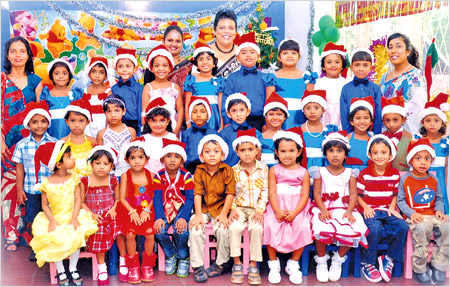 |
|
Here students
of the Wisdom International Pre-school Dehiwala posing for
the camera after the Christmas carols held last year. |
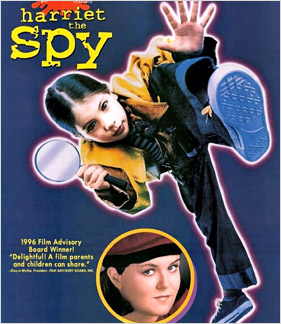 |
|
Harriet the
Spy (1996) will be screened on February 23 at 3.30pm at the
American Centre, No 44, Galle Road, Colombo 3. (Running
Time: 100 minutes) Harriet M. Welsch is a spy. But when
Harriet’s friends find her secret notebook the tables are
turned on her. Can she win her friends back and still keep
on going with the spy business? Please contact the American
Centre at [email protected] or at (011) 2498100 with any
inquiries. |
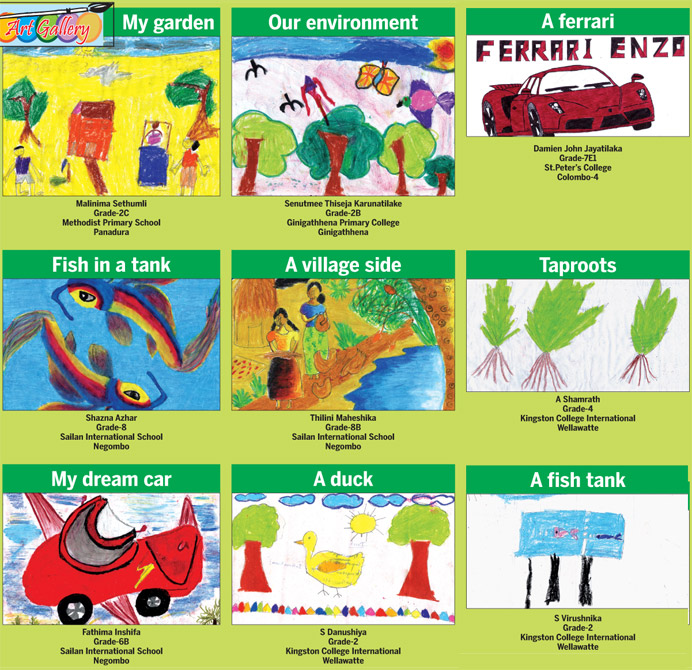 |







